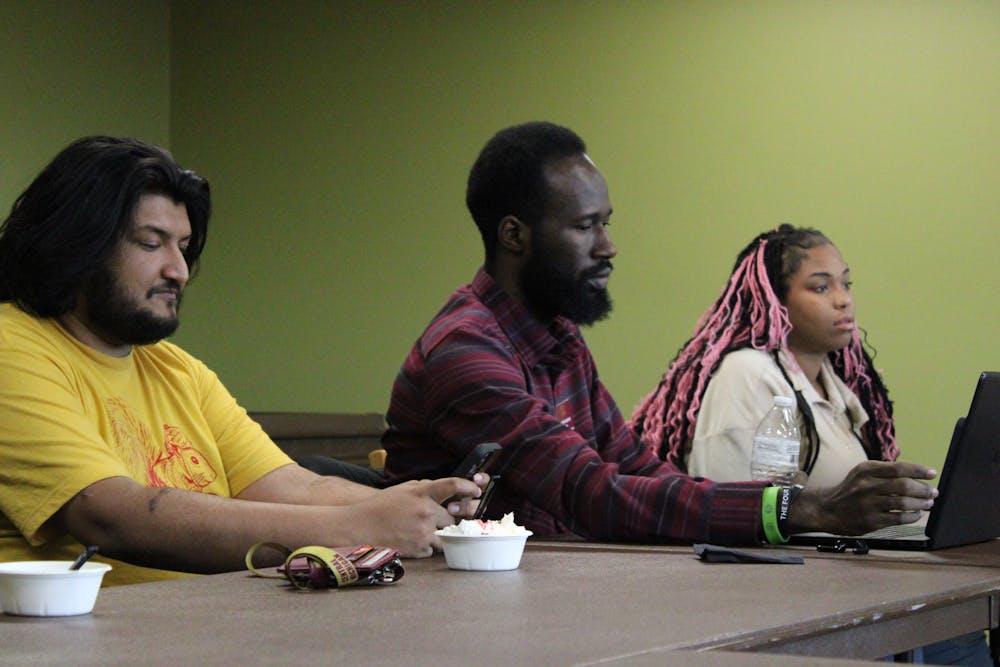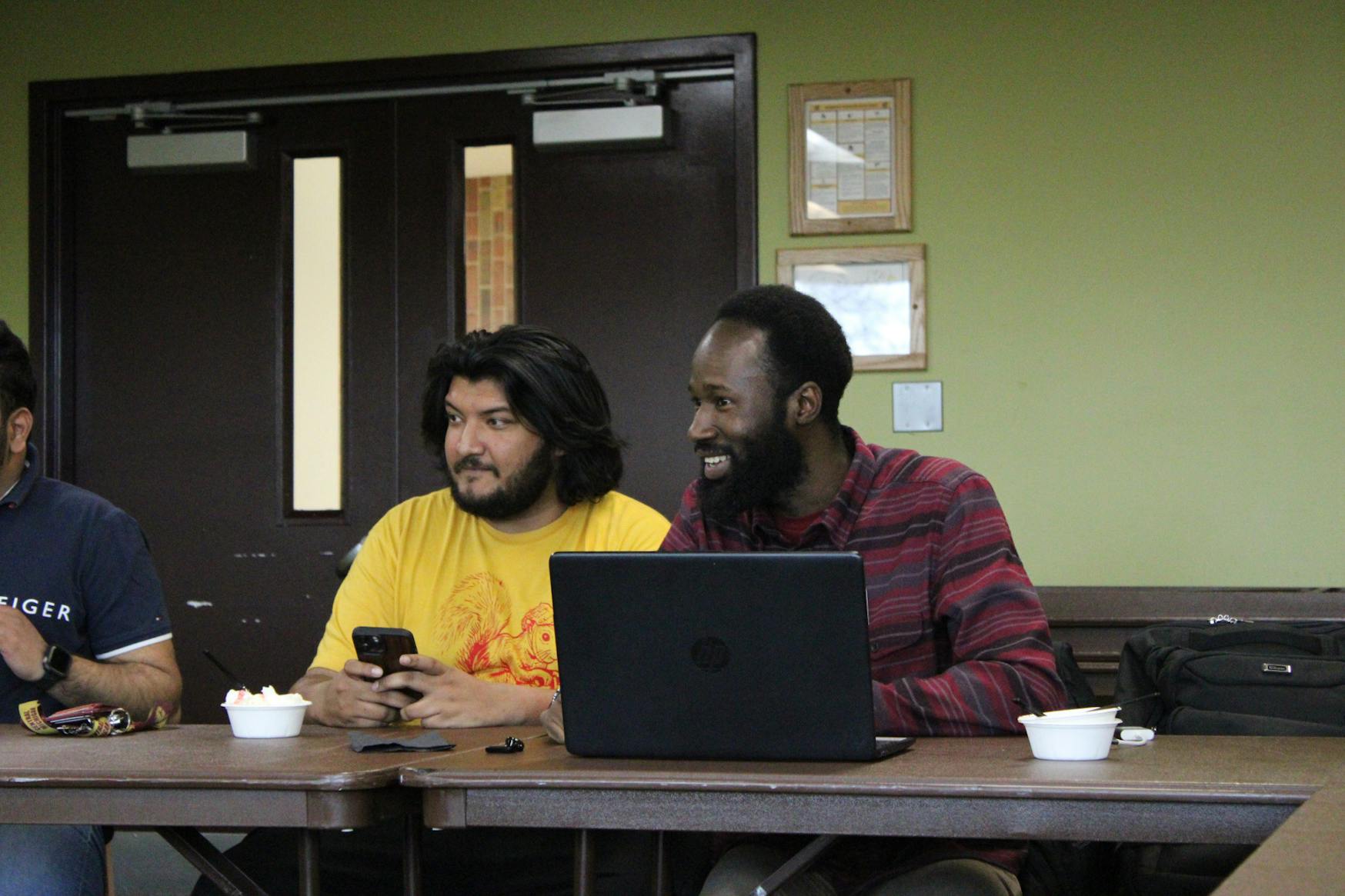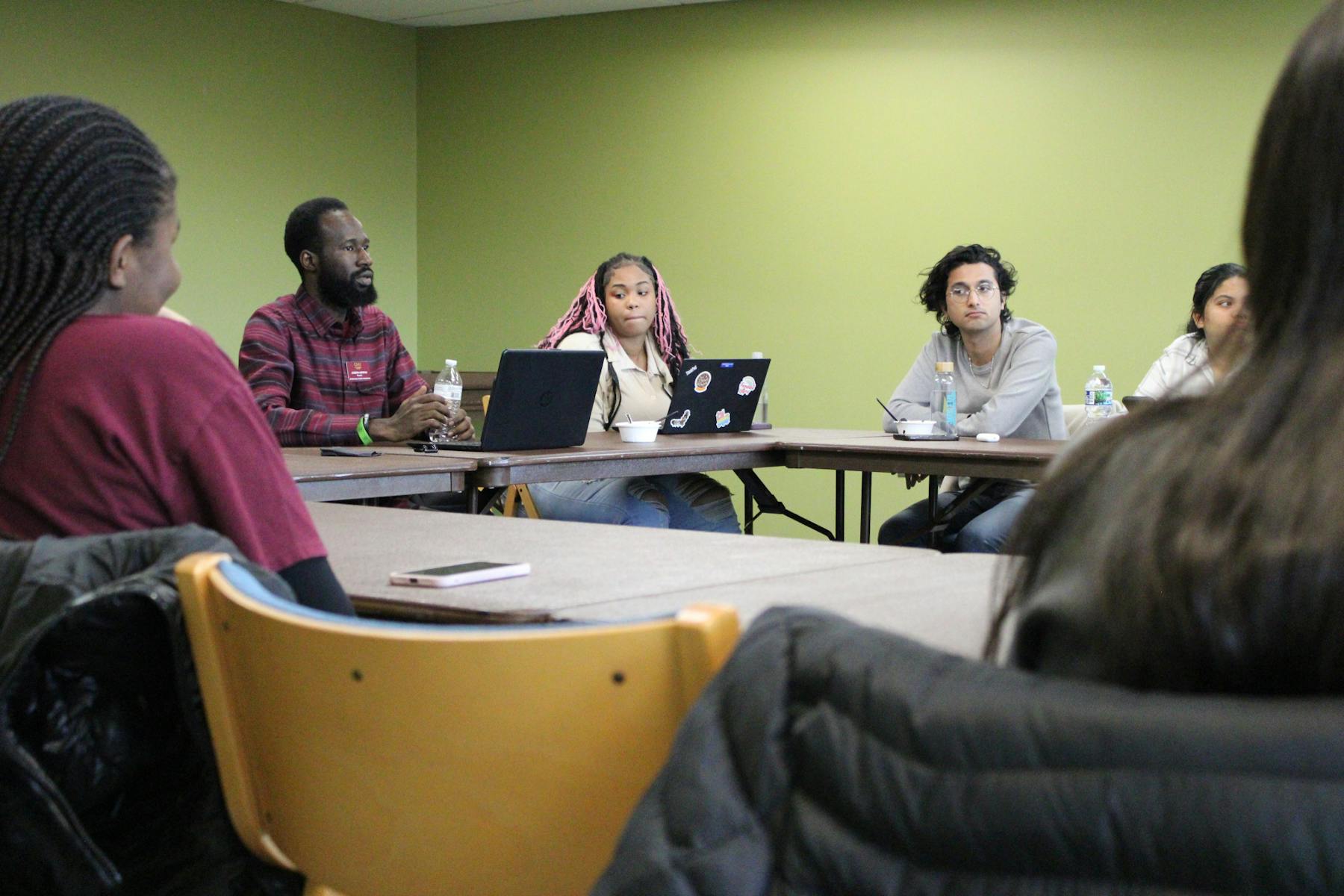MS NEWS: ‘Since I was a boy, I decided I'm going to be president, so the war doesn't happen again’
Multicultural Student Newsletter

Joseph Marah (middle) reads the agenda for the International Student Organization meeting at the Bovee University Center on April 5, 2024.
When it came to rock-paper-scissors at a UNiTE, college ministry, hang out, Joseph Marah kept losing, because as a kid, he never learned the game. Instead, he was hiding from the bullets as the civil war broke out in Sierra Leone.
Now Marah is a Central Michigan University senior with four majors, and is intending to start his master’s degree. He is the president of ISO, a member of Refugee Outreach Collective (ROC), an employee in the International Affairs Office and a business owner.
Yet Marah’s childhood has shaped his identity, he said, connecting him closer to his faith as well as establishing life goals and missions.
Surviving the civil war in Sierra Leone
Marah was born in 1993, two years into the civil war in Sierra Leone.
In 1991, Liberian rebels crossed the border into Sierra Leone in an attempt to overthrow the former president, Joseph Momoh. Momoh deployed troops onto the rebels. By the time the war came to an end in 2002, the violence took the lives of about 50,000 people and displaced more than a billion, according to Brittanica.
“A cousin of mine got shot,” Marah said. “I saw people losing their hands and limbs. My paternal grandfather was locked up in his own home and set on fire, because he was in the military.”
The rebels were abducting children, raping women and enslaving people to mine the so called “bloody diamonds,” the Blackpast read.
“The war was deadly,” Marah said. “People wanted to hold on to power. People wanted to get all the resources from the diamond mining and other people were not satisfied with that.
“I was a baby for most part of it. I used to cry a lot, I used to be a problem in those camps. People are running away from the rebels, and Joseph is crying … People used to tell my grandmother to ‘get rid of this child to save your life.’”
But Marah’s grandmother didn’t leave the baby behind.
“Grandmother on my mom’s side was a key reason why I survived the civil war,” Marah said. “Outside God, she never left me behind when I was crying; she raised me while my mom was in nursing school at the beginning of the war.”
Years later, Marah has created a non-profit charity organization that gives away scholarships for higher education in Sierra Leone. One of those scholarships was named after his grandmother who saved him during the war and two host grandmothers; the other one was dedicated to his sister, who passed away young from hepatitis.
“She loved children,” Marah said. “She loved education. I love education.
“We hadn't seen each other in three-plus years before she passed away in 2015. I was at the time studying at Kellogg Community College, and due to the Ebola outbreak in Sierra Leone, I could not travel home to pay my last respect.”
Now Marah has a 5-year-old son himself. He is still in Sierra Leone, because Marah wants him to understand and appreciate his native culture and language before moving to the United States.
“My son … wanted to get a Spider Man costume,” Marah said. “I’m like, ‘Hey, when I was your age, I was dodging bullets and trying to survive. I didn’t know what Spider Man was.”
Marah said even though the war didn’t leave any trauma for him, such a childhood still paved the way to who he is today.
“I think it's set up my 100% steadfastness,” he said. “Since I was a boy, I decided I'm going to be president, so (the war) doesn't happen again. And I believe that has fueled my faith … because I was like, 'It doesn't make any sense why I survived and other people didn't survive … God had a plan.”
Leadership at CMU and beyond
Now Marah plans to get his master’s degree, to run businesses and soon to run for Sierra Leone’s president position to fight “the corruption in the country, combat poverty and bring people closer to God in a more intentional way.”
“Before I ascend to the office of president, I would like to have created millions of jobs that pay living wages for the 60% plus of our youthful population that are unemployed,” he said. “However, the work does not stop in the private sector, as we need to change the trajectory of the public sector from top to bottom to build solid foundations in all facets, that’s why I’m running.”
Marah’s goal is to create those jobs through Jomana, a business that he is developing. Jomana would be an international organic farm, located in Sierra Leone and the U.S., to fight food insecurity, economic inequalities, poverty, combat substance abuse and create more jobs, Marah said.
“We’re going to solve big problems with this idea, even in America with unhealthy weight gain, food insecurity, poverty and substance abuse. … All components are going to interact with this farm idea using (a) circular entrepreneurial ecosystem model for a sustainable and regenerative economic activity,” he said.
To fund his business idea, Marah is participating in the CMU New Venture Challenge, with a chance to win prize money to incorporate the business. Additionally, Marah’s hope from NVC is to expand his network and to meet with investors.
“I found this business idea on spring break,” Marah said. “The idea came at 4 a.m. (during an) all nightery while I was talking to my friend. We were just talking about life, she was telling me some of struggles in life, and I was telling my business ideas.”
Marah said he sleeps from three to four hours a day, balancing his work and study in economics, entrepreneurship, political science and public and nonprofit administration.

Surith Bhowmick, a CMU graduate student, is Marah’s friend and an ISO member.
“(Marah) is very popular right now,” Bhowmick said. “And actually, he can balance all the works.”
Jeanneane Wood-Nartker, a CMU faculty member in Fashion, Interior Design and Merchandising Department, met Marah at the Community Church in Mount Pleasant. He then joined a smaller group in church and visits Wood-Nartker's house for meetings every Sunday.
“He is very intellectual,” she said. “For example … I can see that just in conversations with him, he is knowledgeable about world politics."
She also mentioned Marah’s TED talk on “Western misconceptions about developing nations,” where he was able to present ways that impoverished people in the U.S. and Sierra Leone can find hope and programs that help them.
“Whether he’s in a class, whether he’s in a small group, whether he’s having a private conversation with you, it’s all the same,” Wood-Nartker said. “He is the same person everywhere.
“And he’s really good at making connections with people and making people feel welcome.”
Bhowmick echoed Wood-Nartker’s statement.
“I know (Marah) from 2023 spring semester,” he said. “I was not connected to the ISO, but every time I went to any events, I saw (Marah) and it made me curious to know about him. I got to know him when he walked into Ronan Hall … I started talking with him, and I actually found him a very friendly guy. He’s a totally understanding person, and this is how our friendship started.”
Marah was the reason Bhowmick joined ISO, as he made Bhowmick believe in himself. At the ISO, Bhowmick said he saw that Marah was a good leader for his people.
“Let me example you, we had (an) international event, and we didn’t have the (permission) to give food,” Bhowmick said. “So, every other executive board member is panicking, then … (Marah) took the risk, and he fed all 250 people.
"I think that’s the actual leader … has to take the risks. That’s how you’re the leader.”
However, Bhowmick said that Marah also has some weaknesses.

Marah and ISO members discuss the upcoming Cultural Expo event at the Bovee University Center on April 5, 2024.
First, as Marah’s pronunciation is different, Bhowmick said he doesn’t always understand what he is saying and the other way around, which causes some communication issues within the ISO. For example, when Marah asked one of the board members to upload some files, the board member couldn’t do that because of the formatting, which took Marah some time to understand, Bhowmick said.
Another thing that Bhowmick said Marah can improve on is making decisions faster.
“We have an event going on, Cultural Expo, which is now limited from six hours to three hours,” Bhowmick said. “That’s no fault of (Marah); that’s the fault of the other executive board member. But I believed that (Marah) had to remove that person who is responsible for that and take action immediately, but he took time.”
This is Marah’s last year as a member of ISO’s E-board, but he will continue to share his culture on campus and take on a leadership role in ROC, he said. Marah’s faith guides his leadership, and for him, being a leader means being approachable and changing the world for the better.
“God is all about helping your neighbor, making a difference, making people happy, putting a smile on people’s faces,” Marah said. “I am not rich, but I’m wealthy. I’m poor and broke, but I’m wealthy, and I’m happy. … I have all those blessings.
“God is working on my testimony, and all I can do is obey His will.”







